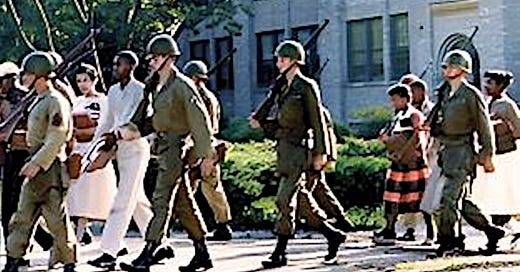JAZZ AND PROPAGANDA
ADAPTED FROM A CHAPTER IN MY BOOK ‘THE BUSINESS’, PUBLISHED BY UNBOUND BOOKS, AVAILABLE AT AMAZON AND ALL OTHER BOOKSELLERS.
In 1955, the US government suddenly noticed how the rest of the world felt about jazz. In the USA, as far as the music industry was concerned, musicians like Duke Ellington, Lionel Hampton and Benny Goodman had seen their best days during the big band boom of the ‘30s. They’d been the pop stars of the moment and jazz was the music they’d played. Now Bill Haley and Elvis Presley had taken over. This was the era of youth and rock ’n’ roll.
But in the rest of the world, jazz was treated with reverence. American record companies saw jazz as commercial, just one more product to sell. It was less profitable than pop or rock, but a steady seller nonetheless. The rest of the world saw it as cultural.
So the State Department instigated a nightly hour of jazz on The Voice of America, the government sponsored radio channel broadcast behind the Iron Curtain. Within months Jazz Hour had picked up an audience of 30 million. Willis Conover, the programme’s announcer, believed people could detect a sense of freedom in jazz. “The musicians agree on tempo, key and chord structure but beyond this everyone is free to express himself. This is jazz. And this is America.”
The State Department then had another idea - if jazz was a perfect metaphor for the USA, why not recruit its greatest living proponents and send them round the world, plugging America, “advertising its core values of non-racialism and fairness”.
Although jazz bands had toured abroad independently for years, State Department subsidies would allow them to reach politcally strategic locations that lacked a profit incentive.
It was a crafty ploy. Send ageing jazz musicians to communist countries to win converts to the American way of life. Later, when capitalism arrived in those places, the locals would buy American records. Music industry executives should have thought of it for themselves.
By 1956 the first jazz ambassador, Dizzy Gillespie, was blowing America’s trumpet in the Balkans. “America’s secret weapon is a blue note in a minor key,” reported the New York Times.
It wasn’t only black artists the State Department sent touring, they particularly liked white clarinetist Benny Goodman because his band included both black and white musicians. The government sent him to South East Asia at a time when the region looked likely to fall prey to communism. Each country he visited tried to do outdo the others in how it honoured him. In Phnom Penh, Cambodia’s King Norodom decorated Goodman with the order of the Chevalier de Monisa Raphon. In Kuala Lumpur he was made honorary governor; in Bangkok, honorary mayor; in Singapore, honorary fire chief.
But there was a false facade to these tours. Black musicians were expected to meet foreign dignitaries at embassy parties in Istanbul or Moscow and praise the racial harmony of American society. One time, when the State Department tried to brief him, Dizzy Gillespie told the press, “I’ve got 300 years of briefing. I know what they’ve done to us. I’m not going to make excuses for them.”
Charlie Parker, Miles Davis and Oscar Peterson were amongst others recruited, yet back home there were jazz clubs in the southern states where they still had to enter through the back door. On one occasion, Alvin Ailey, the choreographer for a dance troupe that joined one of the tours, was grabbed by police in the street in Washington DC simply for being there and being black. He was handcuffed, thrown in a cell and beaten and kicked. When the police found his passport and saw who he was, they let him go. Two days later he rejoined the tour in Athens, attending the usual embassy parties, selling the USA, advertising its core values of non-racialism and fairness.
But sometimes the musicians were pushed too far. In 1957, Louis Armstrong cancelled a trip to Moscow at the last moment because President Eisenhower had refused to send federal troops to Arkansas to enforce school integration laws.
“The government can go to hell”, Armstrong announced to the press.
Secretary of State John Foster Dulles told Eisenhower the situation in Arkansas was “ruining our foreign policy.” So the President relented and sent in the National Guard.
The real problem facing these musicians was that racism was rampant in the State Department too. Duke Ellington’s musicians were flown on a ten-hour flight to Afghanistan in a converted cargo plane. Ellington was furious. He couldn’t believe the State Department would have flown a classical orchestra in such conditions and dubbed the plane “a cattle-car for Negroes”.
No rock group would have stood for it, which proved, perhaps, that market forces worked best.
Playing for profit has always been better than playing for propaganda.
CLICK AND LEAVE YOUR EMAIL - IT’S FREE





Playing for love is really what matters. Doesn't matter who pays. Many black Americans settled in Europe after touring with the big bands and weren't so old. X
Such horrific hypocrisy *makes jazz hand movement*! Then, we had The Black And white Minstrel Show on TV in the UK! White people in black-face! Grotesque.